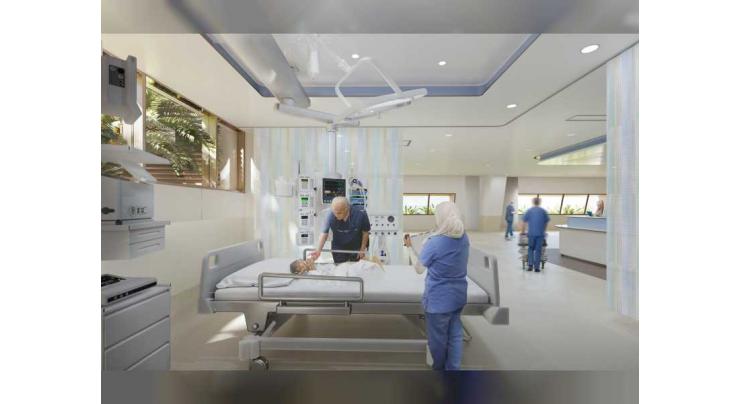
- Home
- Middle East
- Egypt
- TBHF allocates US$4 million for Pediatric ICU at Magdi Yacoub Global Heart Centre in Cairo
TBHF Allocates US$4 Million For Pediatric ICU At Magdi Yacoub Global Heart Centre In Cairo
Muhammad Irfan Published October 11, 2020 | 07:30 PM

SHARJAH, (UrduPoint / Pakistan Point News / WAM - 11th Oct, 2020) Under the directives of H.H. Sheikha Jawaher bint Mohammed Al Qasimi, Chairperson of The Big Heart Foundation, TBHF, and Eminent Advocate for Refugee Children at UNHCR, the Foundation has announced the allocation of US$4 million to build and fully-equip a Pediatric Intensive Care Unit, PICU, at the upcoming Magdi Yacoub Global Heart Centre in Cairo.
The PICU will be named in memory of the late Sheikh Khalid bin Sultan Al Qasimi, son of His Highness the Ruler of Sharjah. Located in 6th of October City in Cairo; Egypt’s Capital, the unit is slated for completion in 2023 and will cater to 2,000 children annually.
The financial support of TBHF, a Sharjah-based global humanitarian organisation dedicated to helping people in need worldwide, is in response to studies and research that highlight cardiovascular diseases as a significant challenge for the healthcare sector in Egypt. While 226,000 succumbed to coronary conditions in the year 2016 only, another 2000 deaths were caused by rheumatic heart diseases annually. In addition, 5,000 of an estimated 18,000 children born annually with congenitally heart diseases lose their lives every year.
TBHF support will help in the provision of one of the pediatric intensive care units at the centre that consists of 16 beds and state-of-the-art medical equipment for post cardiovascular surgery.
The fund will also cover expenses of allocating one or two nurses each to every patient to ensure proper care and effective rapid response monitoring.
When completed, the Magdi Yacoub Global Heart Centre in Cairo will alter the landscape of cardiac care in Egypt, becoming one of the biggest healthcare and research entities for treatment of cardiac and cardiovascular diseases in the Arab world with a patient capacity of 120,000 annually as well as delivering 12,000 free cardiovascular surgeries and catheterizations of which 60% will be dedicated to children.
The hospital will also provide training to 1,500 doctors and surgeons through its training and educational centre operating under the Magdi Yacoub Heart Foundation.
In a statement, Mariam Al Hammadi, Director of TBHF, said that building and equipping a pediatric post cardiovascular surgery ICU translates the vision of H.H. Sheikha Jawaher Al Qasimi to provide specialised healthcare for all members of society, especially children with chronic diseases, irrespective of their social status or financial capabilities.
"We are therefore working with organisations in the Arab region and across the world to help boost sustainable social development by providing education and healthcare services to meet the needs of children and those from low-income communities," she said.
"At TBHF, children are at the heart of our charity endeavours as we believe that by providing a safe and nurturing environment as well as improving children’s health, they can grow up to become the most effective changemakers worldwide. Our support in building this post-cardiovascular surgery PICU aims to alleviate the suffering of children and their parents, and is geared towards advancing Egypt’s healthcare infrastructure," Al Hammadi added.
Professor Sir Magdi Yacoub praised the donation of TBHF, stressing the foundation’s leading role in the field of children healthcare. He pointed out that this collaboration guarantees serving more cases, especially those that are in need of immediate treatment.
He also stated that this collaboration reflects the bond between the two entities as well as the Egyptian and Emirati relations on a bigger scale. He wished for this new hospital to achieve its aims by contributing to the healthcare system in Egypt and later the entire Arab world.
The partnership between TBHF and The Magdi Yacoub Global Heart Centre aligns with the former’s ongoing efforts to scale up a network based on cooperation between institutions of public benefit in the Arab world to boost the capabilities of vital sectors, particularly health and social care, and which caters specifically to low-income segments of the community.
Related Topics
Recent Stories

Faizabad Dharna Commission exonerates former Spy Chief Faiz Hameed

Pakistan calls for enhanced information integrity on digital platforms

Pakistan starts discussion with IMF about new loan agreement: Finance Minister

Currency Rate In Pakistan - Dollar, Euro, Pound, Riyal Rates On 16 April 2024

Today Gold Rate in Pakistan 16 April 2024

Govt hikes petrol price by Rs4.53 per litre for next fortnight

British Investment Group, One Homes, Expected to launch second development at Ce ..

Pakistan Army continues rescue operations in rain-affected areas

"China Ready to Strengthen Counter-Terrorism Cooperation with Pakistan: Envoy"

Why multi-millionaires should live in the cheap countries?

IMF recommends Pakistan to tax non-essential items including cigarettes

High-level Saudi delegation arrives in Islamabad
More Stories From Middle East
-

UAE announces ‘Zero Bureaucracy Program’ to reduce bureaucracy
2 months ago -

COP28 President-Designate welcomes Transitional Committee agreement to operationalise Loss and Damag ..
5 months ago -

Global Media Congress 2023 to feature Co-Production Majlis as a new networking platform
5 months ago -

Young female athletes shine at Abu Dhabi World Youth Jiu-Jitsu Championship
5 months ago -

King of Jordan receives Abdullah bin Zayed and ministers participating in Arab coordination meeting
5 months ago -

Abdullah bin Zayed participates in coordination meeting of Arab foreign ministers, joint meeting wit ..
5 months ago
-

3rd annual conference of Emirates Society of Clinical Microbiology kicks off in Dubai
5 months ago -

SIBF 2023 hosts Nobel laureate to discuss emergence of ‘Afrofuturism’ in global discourse
5 months ago -

ALC announces winners of Kanz Al Jeel Award 2023
5 months ago -

SIBF turns spotlight on remarkable contributions of women
5 months ago -

Global assets in spot bitcoin ETFs hit $4.16 billion
5 months ago -

Rescuers struggle to find Nepal quake survivors as deaths reach 157
5 months ago











